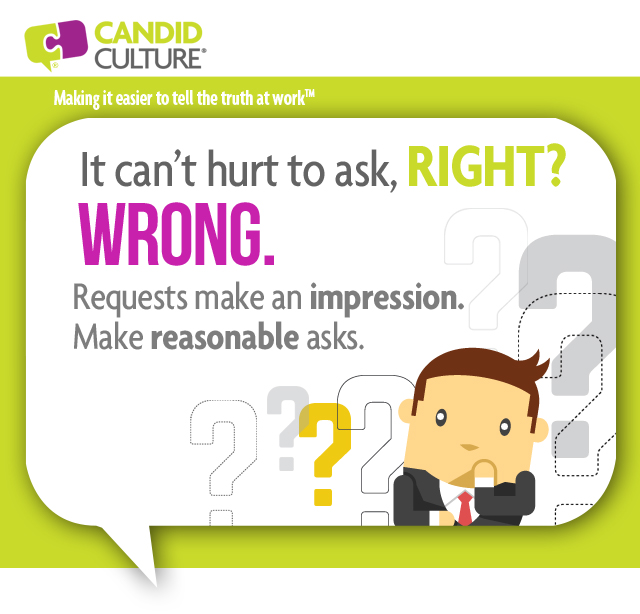Asking for Too Much Can Damage Careers
I recently interviewed a candidate who asked for a lot of ‘stuff’ during the interview process. He wanted compensation, perks, accommodations, and benefits that were way outside the norm. I’m assuming he was employing the adage we’ve all heard, that “it can’t hurt to ask.” Unfortunately, it can hurt to ask.
When forging new relationships, we watch (judge) people. We’re trying to figure out who they are and how they are. Are they the person they claimed to be during the interview process? Are they trustworthy? Did I make the right decision in bringing this person into my team, organization, and life?

Requests always make an impression. When we’re building new relationships, requests make an even bigger impression. Candidates who said the commute wouldn’t be an issue, but complain about it two weeks into the job, cause managers to doubt their hiring decision. Coworkers who consistently ask for extensions to deadlines, appear unreliable.
People watch us and silently judge, making assessments about our commitment, reliability and even character. Don’t make people question you. Make reasonable asks.
Five ways to make reasonable requests:
- Vet your requests with people who know your company, manager, and/or industry, before making them. What is a reasonable request in one organization, might not be in another.
- If something is important to you, ask for it during the interview process or at the onset of new projects and relationships. Don’t wait. Waiting to ask for things, until after you’ve started a job and are comfortable with your manager, can damage your relationships and reputation. Managers don’t like bait and switch, even when it’s unintended.
- Don’t ask again, once you’ve received an emphatic “no.” I worked with someone who asked for something during the interview process. I said “no” and explained why. He asked again after being hired. This annoyed me and made me feel like he didn’t listen and would push me on this and on other things.
- If you aren’t sure that what you’re asking for is reasonable, say so. Tell the person you’re asking what you want and to please tell you if it isn’t a reasonable request.
- Ask for feedback on your requests. If you’ve seen me speak, you know I’m a proponent of telling people, “If I do anything that damages our working relationship or makes you question me, I hope you’ll tell me. I promise I’ll take your feedback graciously, and say “thank you.”
Ask for what you want, within reason, be upfront when relationships begin, and build your relationships rather than break them.
It can’t hurt to ask, right? Wrong. Requests make an impression. Make reasonable asks. Repair a relationship, when you’ve asked for too much.

Tags: building relationships at work, making requests, office relationships, professional reputation, workplace relationships







The works by Linda Babcock and Sara Laschever (Women Don’t Ask and Ask For It) have really helped me out professionally and personally too. I think during an interview, if there is something that will cause you to decline the offer, you should ask for it early. However, if there are few things you’d really like, I think it makes sense to wait until there is an offer and negotiate – once you know you are the top pick, I think there is more room to ask. I don’t disagree with this article. I do think that there is another side for people who do not ask enough. I just read a great concept yesterday about agency vs communion in a book about weightloss for women called Give Yourself More by Georgie Fear and K. Aleisha Fetters. I’ve never heard of the angency/community dichotomy before. It was very interesting. There are problems with both extremes – unmitigated agency (asking for too much and to often – and probably also taking in appropriately) AND unmitigated communion (getting over involved in relationships, helping when it isn’t received). From the examples above, it sounds like you have experienced people with unmitigated agency (from my armchair diagnosis of course!).